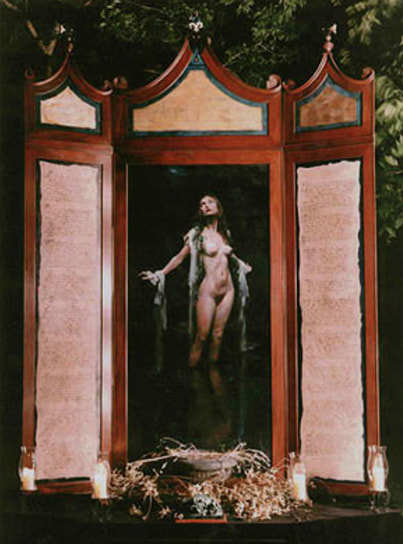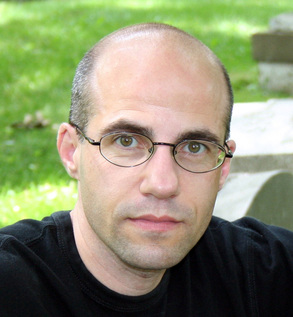Visiting with Frank Paino by Claire Guyton
 The Triptych Altarpiece
of Harriet Westbrook
Shelley by Miles Williams Mathis (used by permission of the artist)
The Triptych Altarpiece
of Harriet Westbrook
Shelley by Miles Williams Mathis (used by permission of the artist)
What inspired "Descent?"
I’d long been interested in the lives of several of the English Romantic Poets, among them Percy Bysshe Shelly. Harriet Westbrook came to my attention since she was Shelly’s first wife. I’d been aware she committed suicide but that event hadn’t inclined me to write a poem. That all changed when I came across a truly remarkable work of art by the artist Miles Williams Mathis called “The Triptych Altarpiece of Harriet Westbrook Shelley.” Mathis’ depiction of Harriet standing weed-wrapped and magnificent in the cold waters of the Serpentine really made me sit up and pay attention. Having seen it, I had no choice but to write about her last moments.
Tell us about your writing process—either generally or specifically with regard to the birth and development of this poem.
With one or two exceptions, my poems always begin after hours of wrestling with a blank page. In fact they begin even before I put pen to paper. I need to get myself to a place, mentally speaking, where I feel ready to write. That usually involves reading work by other people because it serves to lull me into the world of language. Although it may sound esoteric or hyperbolic, I need to get into the place where I can write…a mental place where I’m not really conscious of what I am doing. When I finally get to that point, I’ll write a few words or a phrase in a notebook. Generally, I’ll then write for a while and produce something utterly shapeless…something that will not even remotely resemble the finished piece. Once I have that thing--what I like to call “the blob”—the rest gets fun. I am insanely fond of revising. My poems are truly written in the revision process. Changing a line break can move a poem in a different ent direction. Pushing myself to find a more interesting way of saying something that I’ve described too mundanely also helps. I really try never to take the easy way out and I will not lead the poem. I let the poem lead me.
Name your favorite living writer and tell us why.
I admire too many writers to ever choose a favorite. I also find that my preferences change. That being said, if we’re talking about poets, I am never disappointed by Beckian Fritz Goldberg (for her quirky, original perspective on things as well as her amazing ability to make seemingly ordinary words become extraordinary); Larry Levis (for his ability to take the conversational poem and turn it into something elegant, and for his profound intelligence); Linda Bierds (because her interests often match mine and because the world of poetry is better for her unswerving dedication to exalting language). I’ve only recently discovered the work of Michael Waters. I admire the passion in his work. There are, I’m sure, dozens of others. I also enjoy reading literary journals and coming across poems that just amaze me. Indeed, I just read Rachel Richardson’s beautiful piece, “On the Morning of ________’s Execution” in an archived issue of Hunger Mountain (online) and it blew me away!
What’s the hardest thing to get right in a poem?
I’m often dissatisfied with my titles. Beyond that, the hardest thing for me to do is let a poem go. The temptation is always there to keep revising ad infinitum. I never feel I’ve gotten a poem exactly right.
I’d long been interested in the lives of several of the English Romantic Poets, among them Percy Bysshe Shelly. Harriet Westbrook came to my attention since she was Shelly’s first wife. I’d been aware she committed suicide but that event hadn’t inclined me to write a poem. That all changed when I came across a truly remarkable work of art by the artist Miles Williams Mathis called “The Triptych Altarpiece of Harriet Westbrook Shelley.” Mathis’ depiction of Harriet standing weed-wrapped and magnificent in the cold waters of the Serpentine really made me sit up and pay attention. Having seen it, I had no choice but to write about her last moments.
Tell us about your writing process—either generally or specifically with regard to the birth and development of this poem.
With one or two exceptions, my poems always begin after hours of wrestling with a blank page. In fact they begin even before I put pen to paper. I need to get myself to a place, mentally speaking, where I feel ready to write. That usually involves reading work by other people because it serves to lull me into the world of language. Although it may sound esoteric or hyperbolic, I need to get into the place where I can write…a mental place where I’m not really conscious of what I am doing. When I finally get to that point, I’ll write a few words or a phrase in a notebook. Generally, I’ll then write for a while and produce something utterly shapeless…something that will not even remotely resemble the finished piece. Once I have that thing--what I like to call “the blob”—the rest gets fun. I am insanely fond of revising. My poems are truly written in the revision process. Changing a line break can move a poem in a different ent direction. Pushing myself to find a more interesting way of saying something that I’ve described too mundanely also helps. I really try never to take the easy way out and I will not lead the poem. I let the poem lead me.
Name your favorite living writer and tell us why.
I admire too many writers to ever choose a favorite. I also find that my preferences change. That being said, if we’re talking about poets, I am never disappointed by Beckian Fritz Goldberg (for her quirky, original perspective on things as well as her amazing ability to make seemingly ordinary words become extraordinary); Larry Levis (for his ability to take the conversational poem and turn it into something elegant, and for his profound intelligence); Linda Bierds (because her interests often match mine and because the world of poetry is better for her unswerving dedication to exalting language). I’ve only recently discovered the work of Michael Waters. I admire the passion in his work. There are, I’m sure, dozens of others. I also enjoy reading literary journals and coming across poems that just amaze me. Indeed, I just read Rachel Richardson’s beautiful piece, “On the Morning of ________’s Execution” in an archived issue of Hunger Mountain (online) and it blew me away!
What’s the hardest thing to get right in a poem?
I’m often dissatisfied with my titles. Beyond that, the hardest thing for me to do is let a poem go. The temptation is always there to keep revising ad infinitum. I never feel I’ve gotten a poem exactly right.
Comments:
The Widow September 3, 2010 at 1:08 am
This was a treat! Reading how great writers do what they do is as cool and intricate as the work itself.
The Widow September 3, 2010 at 1:08 am
This was a treat! Reading how great writers do what they do is as cool and intricate as the work itself.

Frank Paino’s poems have appeared in a variety of literary publications, including:The Journal, Iowa Review, The Antioch Review, Kenyon Review, Gettysburg Review, Poetry Northwest, Lake Effect and the anthology, The Face of Poetry. His first two volumes were published by Cleveland State University Press: The Rapture of Matter (1991) and Out of Eden (1997). He has been the recipient of a Pushcart Prize and The Cleveland Arts Prize in Literature. Frank is currently at work on his third collection of poems.
